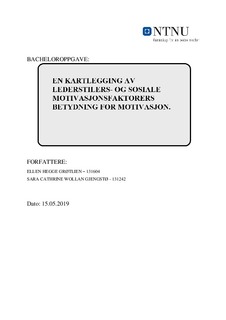| dc.contributor.advisor | Merok, Eivind | |
| dc.contributor.author | Grøtlien, Ellen Hegge | |
| dc.contributor.author | Gjengstø, Sara Cathrine Wollan | |
| dc.date.accessioned | 2019-09-19T14:02:48Z | |
| dc.date.available | 2019-09-19T14:02:48Z | |
| dc.date.issued | 2019 | |
| dc.identifier.uri | http://hdl.handle.net/11250/2617855 | |
| dc.description.abstract | Formål: Å få økt innsikt i temaene ledelse og motivasjon, og å finne årsakssammenhenger som kan øke lederes bevissthet på sin påvirkning på ansattes motivasjon. Vi fokuserte på fullspektrumsteorien fra ledelsesteori og sosiale motivasjonsteorier fra motivasjonsteori.
Metode: En kvantitativ undersøkelse i form av et elektronisk spørreskjema vi sendte til økonomiansatte i utvalgte kommuner på Østlandet. I spørreskjemaet hadde vi påstander om lederne basert på fullspektrumsteorien, og vi ba respondentene rangere hvor enig/uenig de var i disse. De fleste av spørsmålene i undersøkelsen var hentet fra sosiale motivasjonsteorier og avslutningsvis var det to spørsmål som skulle måle generell opplevelse av motivasjon.
Analyse: Vi brukte faktoranalyse for å redusere antall variabler, og regresjonsanalyse for å undersøke korrelasjonen mellom generell opplevelse av motivasjon og rapporterte lederstiler og sosiale motivasjonsforhold. Analysen viste at det var en signifikant sammenheng mellom transformasjonsledelse og motivasjon. Det var også en signifikant sammenheng mellom de uavhengige variablene som omhandlet interaksjonsrettferdighet, likeverdsteori og prosedyrerettferdighet, og den avhengige variabelen motivasjon.
Konklusjon: Vi kunne dermed konkludere med at det er sammenheng mellom lederstil og motivasjon, og at det er sammenheng mellom noen deler av sosiale motivasjonsteorier og motivasjon i vårt utvalg. | |
| dc.description.abstract | Purpose: To gain greater insight into the topics of leadership and motivation, and to find causalities that can increase leaders awareness of their influence on employee motivation. We focused on the full range leadership theory from leadership theories and social motivation theories from motivation theory.
Method: A quantitative survey in the form of an electronic questionnaire that we sent to finance employees in selected municipalities in Eastern Norway. In the questionnaire, we had statements about the leaders based on the full range leadership theory, and we asked the respondents to rate the statements on a scale from agree to disagree. Most of the questions in the survey were taken from social motivation theories and at the end there were two questions for measuring the respondents general experience of motivation.
Analysis: We used factor analysis to reduce the number of variables, and we used regression analysis to investigate the correlation between general experience of motivation and reported leadership styles and social motivation. The analysis showed that there was a significant correlation between transformational leadership and motivation. There was also a significant correlation between the independent variables that was about interactional justice, equity theory and procedural justice, and the dependent variable motivation.
Conclusion: We could therefore conclude that there is a connection between leadership style and motivation, and that there is a connection between some parts of social motivation theories and motivation in our selection. | |
| dc.language | nob | |
| dc.publisher | NTNU | |
| dc.title | En kartlegging av lederstilers- og sosiale motivasjonsfaktorers betydning for motivasjon | |
| dc.type | Bachelor thesis | |
